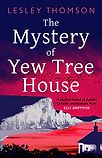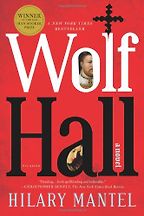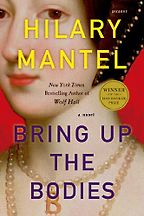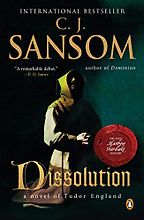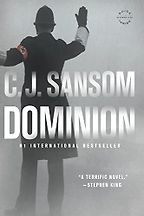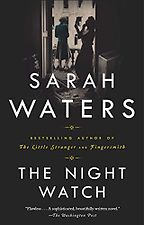So, are you a big reader of historical fiction?
I’m just a big reader. I tend to follow a path when I’m reading. I’ll discover a writer and then I’ll read all their books. That’s usually what happens. That might be crime, or it might be Virginia Woolf. I’m a big fan of hers and she was a very big influence on me in my earlier years. I tend now to read books set in the 1940s and 1950s because I’m quite interested in that period.
Yes, all the books you picked are either from that period, around World War Two, or the Tudor period, so the 16th century. Judging from the number of books published, they’re probably the most popular periods for historical fiction set in England in general.
Yes, they are. For me, less so. I didn’t seek out the Tudors, they came to me via Hilary Mantel and C.J. Sansom. Really, the period I am most interested in, right from when I was a child at primary school, is the 19th century. It’s writers like Wilkie Collins, Mrs. Gaskell and Charles Dickens. They’re all writing in their own periods, so they’re not historical novels. But that’s a period of history that I really like. Anything in the 19th century, I’m fascinated by.
The Second World War came to me more recently because I was writing about it. Two years ago, I published The Distant Dead and I’ve just written about World War II again in The Mystery of Yew Tree House. It’s very vivid to me.
One thing I noticed about the books you’ve chosen is that they’re quite literary: three of them have either won or been shortlisted for the Booker Prize.
It’s interesting that you say that. I do read crime fiction. I obviously write crime fiction. I don’t know if it’s changing but, certainly, I used to be described as ‘literary crime.’ As a writer, I was so sad when Hilary Mantel died, because I thought that a voice had been stilled. I just loved her writing. I loved her talking about writing, too. She gave the Reith lectures. They’re very good. I teach creative writing and I’m always telling my students to read them.
With Wolf Hall, I was right there in the Tudor era. Thomas Cromwell—or her version of Thomas Cromwell—really came alive for me. You live with him and his family. You have sympathy with him and his life and the way he operated. That’s what I want from books: that they take me into another world and immerse me in it.
I’m also very interested in how the past is attached to the present. My own fiction is often with dual timelines.
Let’s look in more detail at each of the books you’ve recommended. As you’ve already mentioned Hilary Mantel, let’s start with Wolf Hall, the first in her trilogy told from the point of view of Henry VIII’s henchman, Thomas Cromwell, who traditionally gets a bad rap.
Hilary Mantel breathes life into history. You see the ruthlessness of Tudor society and you see the parallel with politics and power today. She just has an incredible way of making you smell and touch and feel everything. She brings alive the world and the fear: how easily people’s lives were expendable—one small thing and they were gone.
In the first few books, we don’t really see much of Henry VIII, but we see the effects of Henry. It’s very clever the way that’s done. We see how Thomas Cromwell has to really work things to keep his power and keep his riches. As I said, I felt a lot of sympathy for him, and you see the change in his character through the three books.
She manages to do something that I wouldn’t necessarily rush to, which is you’ve got real people—who did exist—but we’re meeting them through fiction. She did a tremendous amount of research, but even so they’re obviously not who they are—because she didn’t know them.
As a writer, I felt it was hats off to her. I don’t know how she did it, really. The way she got all the detail, did all that research but wore it so lightly. I forgot that she was a contemporary writer. I could have been reading something that was a journal of the times, it felt so real. It’s so clever how she uses the language. You’re not bogged down with the way they might have talked, but you have the rhythm of the language.
You’re also recommending the second book in Hilary Mantel’s trilogy, Bring Up the Bodies.
I read Wolf Hall and then, when the third novel came out, I read them all in a row. It was a really full-on and very moving experience. In the second one, Anne Boleyn is executed. It’s very good in terms of the politics of it, how Anne Boleyn’s death happens. We know so much about this period.
Hilary Mantel is very good on women, too. She’s a feminist writer. You get a sense of all the women in the story, and they have strength and character.
I liked the last book in the trilogy the least, perhaps because it’s full of endings. Also, she made Thomas Cromwell a less sympathetic character. I think that was deliberate. And then, of course, he dies at the end. You can really look at the shape of the story once you’ve read them all. One day, I’ll reread them all again, because they were such a treat.
It’s interesting how she focused on Thomas Wolsey and Thomas Cromwell, these two men who didn’t start with much in a very hierarchical society, and how they got to the top.
Absolutely. That’s got a lot of parallels with today. I’ve only written sections of stories that are historical, but when I’ve been writing them, I’ve seen the parallels with today. That’s partly how I’ve managed to invest those eras with veracity, if you like, with proof and plausibility. Hilary Mantel certainly does that. She takes you into her story.
Let’s move on to your next historical novelist, as you’ve recommended another two books by one author. Have you read all of C.J. Sansom’s books?
Yes, except I haven’t read Winter in Madrid. No, actually, I have. Yes, I have read all of them. Starting with Dissolution. I devoured the rest.
Dissolution is the first in a murder mystery series set, like Hilary Mantel’s trilogy, in the reign of Henry VIII. Shardlake is the main character. Can you tell me a bit about him because I haven’t actually read any of the books yet?
Oh, you have got a treat in store! Shardlake is a lawyer and he, too, is in quite a vulnerable position. In Dissolution his job is to go around all the dissolved monasteries to check out what they’re doing and take notes on what’s happening. He discovers a murder. It really is quite clever, because you’re not thinking, ‘Oh, here’s a murder mystery that he then solves.’ There’s so much more depth to the books than that.
It’s not dissimilar to Thomas Cromwell in the sense that he’s in danger from the royal family or various powers that be if he steps on the wrong side of them. There are other lawyers with more power and he gets on the wrong side of them, and then he has an enemy. As with Hilary Mantel, it’s about the politics and the power struggles of this Tudor society.
Shardlake also has a disability. He’s got a very damaged back, what was called a hunched back in the 19th-century and a ‘crookback’ in his era. That makes him vulnerable physically. He’s not a very well man either. In some books in the series he’s helped by Jack Barak, who is working class and quite tough, who Shardlake is helping to train. Barak gets maimed in one of the incidents they have and loses use of his arm (I think), in order to save Shardlake’s life. It’s a very vicious, violent society.
“It’s a very vicious, violent society”
The murder is there, but you’re not thinking, ‘This is a murder mystery.’ You’re thinking, ‘I’m in the Tudor times, I’m looking through a window. I’m a silent witness to all of this’ because CJ Sansom is very hot on his research. He was also a lawyer, so he knows the legal stuff and has done lots of legal research.
They’re fantastic stories. The series is one long chronicle if you like. He’s written seven so far. The last one is called Tombland, a really gruesome name. It’s a real place, if I remember rightly. It’s also very painful, because Shardlake is really very ill by this time. There’s a lot of bloodshed. Again, he just brings alive a period of history. Because you have a fictional narrative, you really have a story arc that you’re completely involved in.
I really recommend people read these two series—Hilary Mantel and CJ Sansom—in tandem, one and then the other. Don’t compare and contrast, just enjoy the whole panoply of fiction because these two worlds together—and I probably have, in my mind almost got them fused—are written by two great writers. When I was reading CJ Sansom, I found myself wondering if I would see Thomas Cromwell going by. It’s the same historical period, written about by two very different writers, but both of them able to really bring you into their world.
Let’s go to a much later period now, the 1940s and 1950s. The next book you’re recommending is also by C.J. Sansom and it’s called Dominion. This one’s a bit different.
Dominion is about the Second World War, but it’s a ‘what if?’ book. What if the Germans had taken over? I don’t know if that really counts as historical because none of it happened. I wouldn’t normally be drawn to a book that isn’t rooted in actual history, but you really get involved with the characters and it’s so vivid.
He describes a big building in London with a nasty swastika hanging from it, and it’s lit in red. You can absolutely see how it would have been.
So the premise is that Winston Churchill didn’t take over from Neville Chamberlain in 1940. Instead, Lord Halifax became prime minister and he favoured appeasement.
Yes, we’ve become a kind of satellite of the Third Reich. The Nazis have made promises, and they’ve been breaking those promises. At first, they let the British have certain things and then those have gone. We’re more and more under the power of the Nazis.
I read it about three years ago. It makes you realize how flimsy democracy is, how fragile our society is. We might so easily have been in that position, had we continued to appease Germany and let the Nazis in.
It’s a really clever book. It’s also completely gripping once you get into it.
Yes, lots of the reviews focus on what a gripping thriller it is.
It really makes you think, ‘But for this happening or but for that happening, but for that personality…’ That’s what interests me as a writer, how things can so easily go wrong. How the dynamics can cause issues and drama and it becomes a completely different story. I was less drawn to the story than I was to that idea, but then once I was in it, I was in it.
Let’s turn to the last book you’re recommending. This is The Night Watch by Sarah Waters, a book that was shortlisted for the 2006 Booker Prize.
I love this book. I first read it years ago, when it came out, and I read it again ten years ago. I also taught it for a while. I’ve just read it for the third time when I knew I was going to be talking to you. I finished it yesterday.
It’s set during the Second World War and it’s mainly the story of this group of six women. They’re doing men’s jobs and have much more leeway than either before or after the war. So they’re working in factories, driving ambulances, being ARP wardens or firefighters—because there weren’t the men to do those jobs.
Sarah Waters starts from the end of the story and we end at the beginning. When we meet all these characters, their story is the past. But it’s in front of us. For example, there is Kay, a butch, gay, very gallant woman, who is painted as very sexy. They all smoke like hell (which I don’t think is sexy). She rescues people. But by the time we meet her at the beginning of the story, she’s living in lodgings. She’s very lonely. She just watches people arriving and leaving from the house in which she lives. You’re opening the book at the beginning, but the beginning is the end.
The Night Watch is so clever. It makes us look at the way the drama unpeels, as opposed to unfolds, if you like. We get to the ‘Oh, that’s why and that’s why and that’s why.’ It’s another way of looking at history, which I also thought was really interesting. Have you read it?
Not yet.
It’s worth reading! It makes you think about memory, and decisions made that might be wrong, and if only we hadn’t made that decision, we wouldn’t have found ourselves here. There’s a certain level of fatalism because as you’re reading the story, you already know the ending. You know that nothing can change. Nothing that happens along the way can make a difference.
It makes you think about life and where the decisions we’ve made have taken us. And how, when we look back at things, we see the point at which they happened. That’s exactly how we see our own lives. Ten years ago, I was there but I was always going to end up here. Because I’m here today. The concept has stayed with me all this time. I had no trouble choosing The Night Watch for this list because it’s so brilliant.
In comparing these books, I could group Dominion and The Nightwatch together. They’re both stories around the Second World War, and they also both play with our understanding of reality. One is ‘what if?’ and the other one is, ‘because this happened, this had to happen. This is how we got here.’ One is more of a dissection of the present, and the other a reinterpretation of the future. They’re both very clever, in their different ways.
Finally, tell me about your latest book, The Mystery of Yew Tree House, which is partly set in World War II. It’s the ninth book in The Detective’s Daughter series. Do you recommend that people start at the beginning of the series, or can they start with this one?
It’s a bit like I was talking about with Sarah Waters. Often, I’ll pick up a book, read it, and discover it’s number seven (say) in a series. Then I’ll go back and find out what happened before. If people start with The Mystery of Yew Tree House and that makes them want to read the others, they’ve lost nothing by starting with number nine, not at all. They can go back and see how it all began. That’s what I would do. I write each book to be read as a standalone. It’s of itself.
You mentioned dual timelines, which of your books have that combination of the past and the present?
The Detective’s Daughter is partly set in 1981. The murder happened two days before Charles married Diana, so part of it is set then. A Kind of Vanishing was partly set in 1968. The Distant Dead and The Mystery of Yew Tree House have big chunks which are set in the Second World War. The Distant Dead is set during the Blitz in London and The Mystery of Yew Tree House is set in Sussex in 1940.
Tell me a bit about the detective’s daughter and who she is.
Her name is Stella Darnell. Her father gave her an application form for the police when she was 18 and she tore it up. She never wanted to be a detective and did not want to follow him into the Metropolitan Police. She saw how it ruined her parents’ marriage. She never saw her father, he was always being called away. That wasn’t the life she wanted.
So in lieu of something else to do, she starts cleaning, which she actually loves. She starts a cleaning company. By the time we meet her she has a successful cleaning company and has been doing it for years.
Five Books interviews are expensive to produce. If you're enjoying this interview, please support us by donating a small amount.
In the first book, her father has died. She meets Jack when she’s cleaning out her father’s house that she’s inherited and comes across an unsolved case of his from 1981. She starts investigating it. That’s how she meets Jack, who is investigating it too because it’s his mother’s death and he wants to find the person who did it and kill them.
In the first few books, they’re just a very mismatched investigative duo. Other cases come their way by accident and design. But eventually they do get together. And by the time we reach The Mystery of Yew Tree House, they are together as a couple and there’s the question of whether they’ll live together. That’s where the story has got to.
The story in The Mystery of Yew Tree House was partly inspired by the concrete pillboxes that you see scattered around the English countryside, is that right?
Yes, I started noticing them when I was a child, because we came down to Sussex for the holidays. I vaguely knew that they were used for firing a gun through but it’s really only in the last 18 months that I started wondering, ‘What was the reality of these dark, dank places?’ Sheep tend to take shelter in the one near us. Then, when I started reading about them, I was fascinated to learn about the building of them and how they were designed. Some of them are almost inaccessible, they’re so overgrown with brambles. Of course, I’m a crime writer so what I thought of doing was putting a body in one of them.
Did you have to do a lot of research for the book?
I did a huge amount of research, partly because I just got so interested. Some of it is interviews, some of it walking the ground of where something is, and a lot of it is reading. I read this great big biography of Churchill and another biography of somebody who’d worked for Churchill. None of which has gone in the book, but what’s gone into the book is the sense of really belonging there, of really centering the past in that way, which, of course, is going back to the books I’ve chosen, what C.J. Samson and Hilary Mantel would have done to a greater extent than me. They really, really immerse themselves in the period. You could research forever, like Casaubon in Middlemarch. I’m not in that category, but I do miss doing research for the periods and subjects I’ve done in the past, including this one.
How did you find out about the Auxiliary Units, aka Churchill’s Secret Army, which some of the teenagers in your book are part of?
I came across a review of a book about them. They were called ‘stay behinds’. If C.J. Sansom’s reality of a German takeover had happened, they were the ones in the underground bunkers, the guerilla army. They were volunteers, though that’s probably a bit of a loose term, I don’t think they had much of a choice. They were trained in brutal fighting techniques. Their instruction was to ‘butcher and bolt.’ They were incredibly brave because if a German invasion had come to pass, they would eventually have been killed in a horrible way. They were never able to talk about what they did, because they had signed the Official Secrets Act. They never got a pension or any recognition for what they did.
Five Books aims to keep its book recommendations and interviews up to date. If you are the interviewee and would like to update your choice of books (or even just what you say about them) please email us at [email protected]

